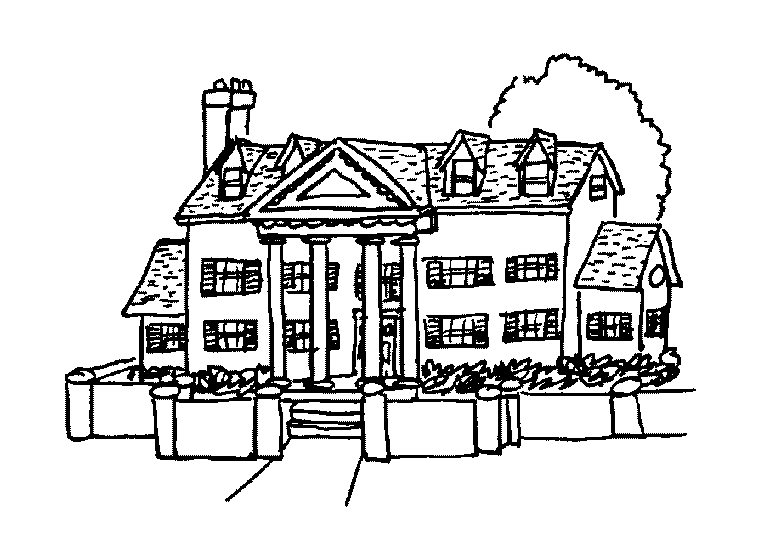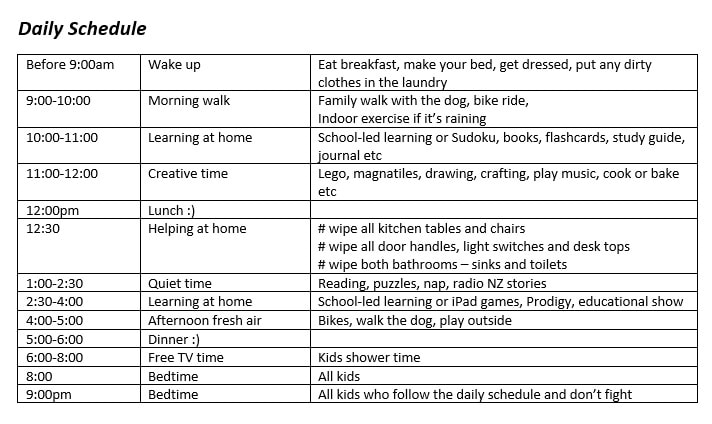| Our schools have closed, and the country is in lockdown. We don't know how long the novel coronavirus crisis will disrupt our lives. So now what? Are all parents of school-aged children suddenly homeschoolers? What do they need to do? What if I don't want to send my kids back to school after the lockdown? |
What is homeschooling (home education)?
Homeschooling implies these things have occurred:
- Parental choice
- Forethought and planning
- Accessing suitable resources
- Submitting an exemption application, which requires outlining in some detail a complete plan for the first year of your child's home education
- Receiving a certificate of exemption from the Ministry of Education
School children in COVID-19 lockdown
For affected families, I would suggest that, while they will be different from normal, that you do treat this time as school holidays. Put aside any pressure you are feeling to be your children's "teacher" and enjoy being their parents! Read stories, play games, build towers, make forts under the table with blankets, observe bugs in the backyard, watch movies and documentaries, have "tea time" with tea and some baking and talk about life or read poems or take turns telling stories, cook together in the kitchen or spend some time on your favourite (or new) crafts or hobbies, write letters to family and so on. (Pro tip - this is what a good chunk of actual "homeschooling" looks like anyway :-)).
By the end of the school holiday time, the Ministry and schools should have things in place so your children will be provided with resources and access to things to continue their regular (or modified) program of learning at home. Yes, you'll need to supervise them, and yes you'll need to support them as required. But the burden of planning and teaching and marking and putting together resources etc will not rest substantially with you.
Even so, when things are available, keep in mind that these are not normal times. Your children may be anxious about all that is going on, but even if not, they will not be in their normal routines. Be kind and be patient, with them and yourselves. Above all, do not feel pressured to replicate the classroom at home. Children learning at home with a parent do not need 6 hours of "school" as they have normally.
When lessons become available, certainly make a plan to allocate regular time to them. How long they take will depend in part on how well your children are able to focus on them, but as a rule of thumb from the homeschooling world, children ages 5-7 only need about a hour of focussed academics per day. This will slowly increase with age to around 2-3 hours for 10-12 year olds. Highschoolers will usually have a fuller program - though this depends on the style of what they are doing. 3 hours is usually still plenty for Years 9-10 unless doing a particularly academic program, with more for students doing NCEA etc.
In these circumstances though, nothing is normal. If each day you spend a bit of time on the 3Rs (reading, writing, arithmatic), and some time in discussion or research about topics of interest, and some time doing something hands-on or practical (science experiments, cooking, gardening, sewing, construction, art, baby care, animal care, chores etc etc), then consider it a day well spent! Children are wired to learn and will do so in pretty much any situation. This is not the time to worry over much about achievement standards, how many pages got done etc.
Remember, what your children need most at this time, is a parent. One who makes them feel loved and secure. Not a teacher who is too frazzled to be their parent!
I don't plan on sending them back to school in 4 weeks. What do I have to do?
- Their children (or other family members) are medically vulnerable, and they consider the risk of exposing them to COVID-19 is too high.
- They've always wanted to homeschool (or have seen how great it is to have the kids learning at home), and this situation has given them the nudge they needed to make it "official"
For parents whose children are vulnerable, you have basically two choices - either to work with the school and/or get a medical certificate to keep your children home for the duration, in which case they will remain enrolled in the school, and the school is expected to faciliate their learning by sending work home etc, OR take the plunge and become "real homeschoolers."
For parents who do decide to home educate their children going forward, then there are steps you need to follow. These include:
- Consider what you want your children's program of learning to look like and what, if any, specific resources you will use for the first year. There is a lot of good info about this, as well as resource ideas, at www.nchenz.org.nz. You will need to be able to outline this program in your application.
- Read the Ministry's website for some general information, and download the application forms HERE
- Complete and submit the application to the Ministry; it will take 4-6 weeks for them to process the application and approve the exemption (it can take longer if more information is required).
Other resources and support for "unexpected homeschoolers"
There are also a lot of producers of online educational resources who are making access free due to the COVID-10 situation. Type "Free educational resources COVID 19" into google and you've find several postings with lists and links. I'm not including a specific link as more and updated lists are appearing all the time.
Conclusion
And to those parents who are also trying to juggle working from home at this time, I know this is not easy! I'd encourage you to focus on finding a balance between what you have to do, and ensuring time to take care of yourselves and your children as well. For you it's even more important to not feel unnecessarily pressured about academics right now, but to figure out a routine that works.
Hang in there parents - this won't be forever. Remember, these are "unprecedented times"!
Covid Distance Learning Q&A – from a school principal
**Usual disclaimer, I'm a school principal but I speak only for myself. Others may have different ideas**
Few points to note first :
1) This is not homeschooling. This is an unprecedented emergency situation impacting the whole world. Let's keep perspective. This is at best distance learning.
2) You are, and always have been, your child's primary educator. If you decide that your child isn't going to engage with anything sent home and is going to spend the entire period playing in the dirt, or baking, or watching TV, that is your choice. That is your right. It is clear in the constitution. There is nothing to stress or feel guilty about.
3) Schools don't know what they're doing either. They got no notice, no prep time and we're told 'continue to plan lessons as normal and just send them home' as if that is in any way possible.
4) It is absolutely not possible to facilitate distance learning with a primary aged child and work from home at the same time. The very idea is nonsense. If you're trying to do that, stop now. You can certainly have activities where your child learns, but your focus is your job, and survival. Again, unprecedented. Stop trying to be superheroes.
So, a few FAQs:
- My school has sent home lots of physical work. Pages and pages, hours and hours. How am I supposed to get through it all?!
You're not, don't try. Your child's teacher spent a couple of hours in utter panic gathering things to send home so they could say they did their best and there weren't a lot if complaints that enough didn't go home. It's not a competition, or a race, it's unlikely the teacher will even manage to look at it all.
- I'm not doing any work with my kids. All their doing is Lego, cooking and playing outside.
All of this is learning. Very valuable learning. Give yourself and them a break.
- How can I get three different lots of work done with 3 different kids of different ages?
You can't, stop trying. If they're old enough, try to get them to do little bits independently. Otherwise try to do something they can all engage with, reading a story together, some free writing, baking etc.
- So what's the bare minimum you'd expect?
For me, survival mode. I won't pretend that may be true of all teachers, but you know what if they can't have perspective in a time like this then I wouldn't overly worry about their opinion anyway.
My ideal for my kids in our school?
- A bit of reading every day (independent or to them or via audiobook etc)
- some free writing now and then. If they'll keep a diary or something, great. If not, would they draw a comic?
- Practical hands on maths. Be that via cooking, cleaning, outside or some maths games physical or digital.
- Some fine motor work. Lego, cutting, playdough, tidying up small toys.
- Physical exercise everyday
- Some art/music where possible through the week. Doesn't need to be guided.
-Stretch goal, if old enough getting them to independently work on a project is great for keeping brains ticking over. Get them researching in a book or online and putting together something to present to you or family.
- If younger, lots of imaginative free play, the more independent the better.
You are doing enough. You are loving your kids and supporting them through a difficult time. Look after yourself. Minimising stress is absolutely vital in a time like this for mental health. Don't let this be something that stresses you. Only you can control that by accepting it is in your circle of control, you are the primary educator and this is all your call.


 RSS Feed
RSS Feed
